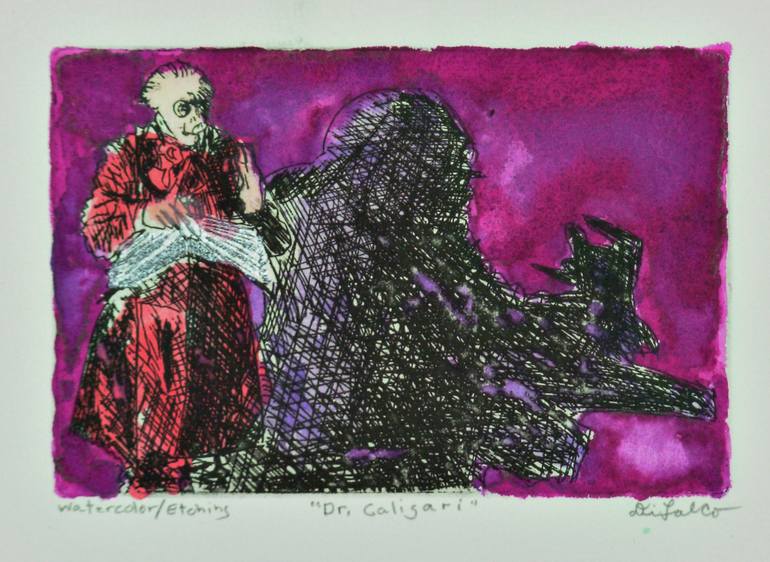


VIEW IN MY ROOM
Doctor Caligari Painting
United States
Painting, Paper on Paper
Size: 12 W x 9 H x 0.5 D in
Ships in a Box
Artist Recognition

Artist featured in a collection
About The Artwork
This work by Di Falco is a Mixed-media and mixed-genre creation that employed the use of printmaking (etching on a zinc plate developed in Nitric acid baths) and painting (watercolors and gouache). It depicts a scene from the 1920 silent horror film from Germany entitled, The Cabinet of Dr. Caligari, or in German, “Das Cabinet des Dr. Caligari”. This cinematic masterpiece, directed by Robert Wiene and co-written by Hans Janowitz and Carl Mayer, has become the archetypal example of German Expressionist cinema. It concerns the story of a fanatical hypnotist, played by actor Werner Krauss, who manipulates a somnambulist, acted by Conrad Veidt, to commit murders. The film’s plot unveils itself in a sinister and salient cinematic style, with sharp edges, tilted and twisting horizons, structures and landscapes that lean and twist in unusual angles. The camera work weaves in and out of shadowy and stark light, enhanced by a set of minimalist geometric illusions. This film has had a major influence on US films, particularly in the genre of film noir. The studio etching techniques include Intaglio and drypoint. The French inks and paper used (Respective Brands: Charbonnel and RivesBFK white) were enhanced by watercolors and gouache. Image size, or the size of the zinc etching plate used, was four inches high by six inches wide, or 10.160cm by 15.240cm. The etching required three separate baths in Nitric acid before the final image was obtained.
Details & Dimensions
Painting:Paper on Paper
Original:One-of-a-kind Artwork
Size:12 W x 9 H x 0.5 D in
Frame:Other
Ready to Hang:Not applicable
Packaging:Ships in a Box
Shipping & Returns
Delivery Time:Typically 5-7 business days for domestic shipments, 10-14 business days for international shipments.
Handling:Ships in a box. Artists are responsible for packaging and adhering to Saatchi Art’s packaging guidelines.
Ships From:United States.
Have additional questions?
Please visit our help section or contact us.
United States
Imagery and storyline—both vital components of my creative process—enable me to create a form of visual poetry. Consequently, photography is intricate to my artistic strategy, especially with regard to my etchings. In view of this, many of my printed images—accomplished via the studio techniques of intaglio, aquatint, drypoint, and Chine collè—originate from my own photographs, as well as ones I uncover during research into the archives of academia, historical societies, and museums. Upon locating a scene that fascinates me, I first sketch a few original drawings of the likeness, and next transfer that drawing onto my prepared zinc etching plate. NOTE: In my etchings that incorporate the Chine collè process, I use mulberry bark paper from Thailand, which is infused with Japanese kozo threads. The paper is also treated with methylcellulose. I endeavor to establish links between the metaphysical and physical worlds . . . between the realms of dream and reality . . . and between the natural and the fabricated. In a sense, I believe that art unveils everything that we mask behind our assumptions and biases . . . or rather, those realms we neglect—or refuse—to perceive. My label for our failure to examine these areas is, “The Phenomenology of Non-Connectedness", which I blame on today’s communicational tools such as Social Media, the Internet, texting on smart phones, and “tweeting”. MY ETCHING TECHNIQUE I work on metal etching plates treated with both hard and soft grounds. These grounds consist of mineral spirits, beeswax, oil of spike lavender, and other natural substances. After these grounds dry, I draw images with needles and other tools onto the plate. Next, the exposed areas are “etched into” the zinc or copper plate in a bath of Nitric Acid and spring water. An artist’s proof in then printed after the plate is cleaned; Moreover, two to seven additional plate workings, acid baths, and proof printings occur before my desired effect is obtained. When satisfied with my end result, I apply oil based etching ink onto the clean plate and then remove the excess ink with several wipes. Next, I align my etching plate onto the printing press bed and cover it with papers and press blankets. Finally, the plate goes through the press to obtain my print. This process is repeated until all editions are created. I usually create three to five editions of five or six etchings for each one of my plates.
Artist Recognition

Artist featured by Saatchi Art in a collection
Thousands Of Five-Star Reviews
We deliver world-class customer service to all of our art buyers.
Global Selection
Explore an unparalleled artwork selection by artists from around the world.
Satisfaction Guaranteed
Our 14-day satisfaction guarantee allows you to buy with confidence.
Support An Artist With Every Purchase
We pay our artists more on every sale than other galleries.
Need More Help?